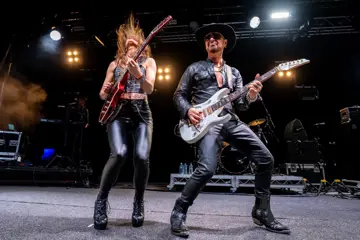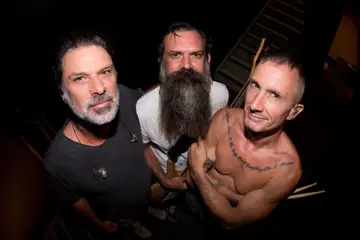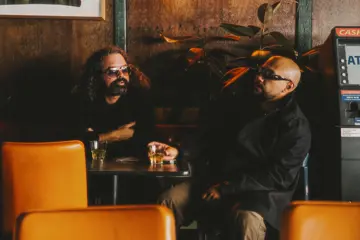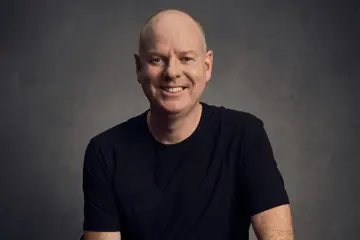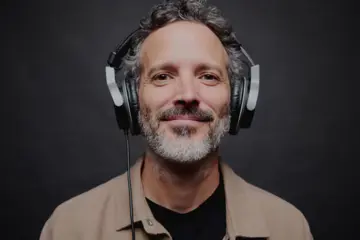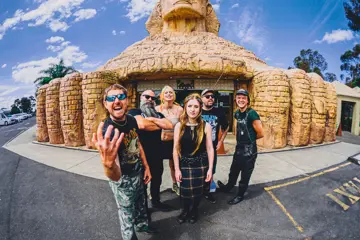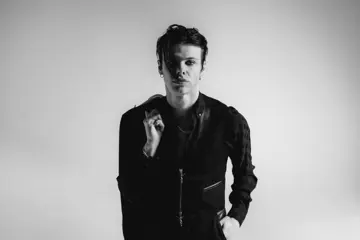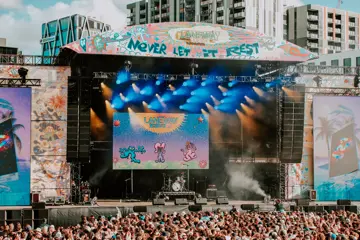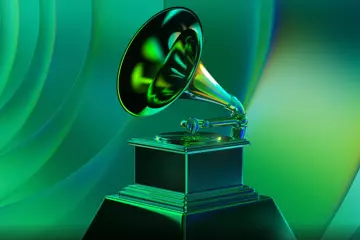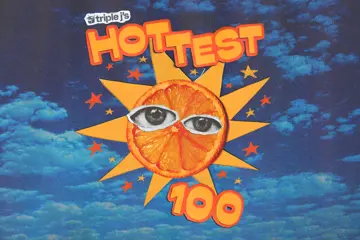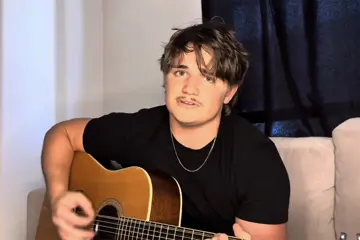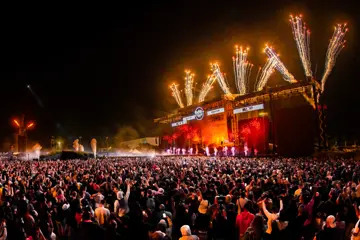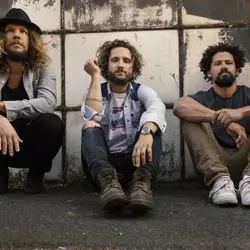 John Butler Trio
John Butler TrioTuesday 13 November, John Butler found himself in the NSW Parliament House receiving a Support Act “Excellence In Community Support” Award, an award presented annually recognising “members of the music industry who, by their tireless efforts and charitable works, have made a difference and enriched the fabric of the broader Australian community”. Butler was an obvious candidate for, among other things, his co-founding of The Seed program of grants that seek to improve artistic diversity, the full team for which he accepted the award on their behalf, as well as his political activism advocating peace, harmony and environmental protection. Only the month before he'd joined 150 or so people protesting outside the BHP Billiton headquarters in Melbourne over the corporation's involvement in the proposed James Price Point gas industrial complex in WA's Kimberley region near Broome.
All of which makes him the obvious headliner for the Peats Ridge Sustainable Arts & Music Festival, held annually in the three days leading up to New Year in Glenworth Valley. Joining the John Butler Trio at Peats Ridge 2012 are Sharon Jones & The Dap-Kings, The Black Seeds, Friendly Fires (DJ Set), The Herd and far too many more to list here – 200 artists all up performing across ten stages over three days.
While the interest in the festival inevitably surrounds its always impressive entertainments, the organisers of Peats Ridge have always based it on the premise of its not only being sustainable, as in as ensuring it leaves a negligible carbon footprint, but also to raise awareness among its patrons, through a dedicated eco-living education program as well as extensive environmental initiatives, of ways to live more sustainably in general. As such, Peats Ridge won the 2010 Australian Event Award for Most Sustainable Event in Australia and has been officially acknowledged by the UN for its work in Environmental Education.
“I think it's amazing that a festival takes the initiative to do that,” Butler feels. “I'm sure it'd be easier not to on the part of administration and logistics. Sustainability in general is important to me, just because it makes perfect sense,” he chuckles. “It seems to me a logical way of surviving, so I don't see it as much of a political thing or an environmental thing but just something that makes a lot of sense.”
Don't miss a beat with our FREE daily newsletter
As someone who has played a lot of festivals around the world, Butler admits he hasn't come across any other festival committed to the concept of sustainability. “There's the Folk, Rhythm & Life Festival [held at Bilyana in Victoria over the past two decades], which I haven't played but have heard about for years. They went a long way to lower emissions and lower their impact by creating self-composting toilets and things; and those guys ended up doing Falls Festival and ended up going around the world and doing it for other festivals too. So I've certainly seen certain individuals who are thinking outside the box and go round and really share that dream and really, once again, it's common sense. Those toilets ended up costing them less money and less hassle and were better on the environment. I guess that's the coolest thing about looking at sustainable technology; it just makes sense. It's like a triple bottom line it's so large.
“There are nice little creative and kooky ways to make things sustainable, like I worked a gig in the States where one stage was completely run by people riding on bicycles,” he laughs. “It was awesome! It was a small stage,” he reassures, “but a stage all the same.”
Butler's environmental credentials are well-known. A supporter of The Wilderness Society, he has been active in the Save Ningaloo Reef and Save The Kimberley campaigns, the latter seeing him performing in a free concert organised by The Wilderness Society in Melbourne's Federation Square this past October alongside Clare Bowditch.
For all that, Butler has to admit that it's incredibly difficult to reduce one's carbon footprint as a touring artist. “I guess that's one of the reasons why I try to balance it with other acts. As far as the music industry is concerned, it's quite energy intensive. There have been times we've, on our tours, bought accredited Green Carbon Credits from New Zealand, wind factories and solar fields and things like that, but it's such early days that a lot of times, with the carbon trading and carbon taxing and all that, it's all kind of up in the air; you kinda don't know whether you're efficiently and sustainably spending your money in the right direction.
“So I guess it gets down to reducing and seeing how much what we can do. When organising a tour, if we can road-freight it and just cut the carbon down by not leaving it too late and having the air-freight everything, then that's what we do – try to slow-freight as much as possible. That's just one way. Unfortunately, the bus culture in the States, and in Europe, they won't insure your bus if you run anything more than b20 [20 percent biodiesel, 80 percent diesel], because of filters and stuff like that, so it's like the insurance companies stop you from actually wanting to do the right thing. But where we can, we do, you know? I'm in my garden as we speak and I'm really enjoying seeing my garden grow.”
In the end of course, Butler most accessible contribution to the debate is his music. As he puts it, “the measurable impact is hard to measure, but I definitely think that music changes people and people change the world. Art changes people”. In terms of songs advocating social or environmental change, “I sort of let my political activities, benefits and concerts, be that direct link, you know, going to blockades and stuff like that. I'm less and less writing about it, 'cause I have, like I've written those songs and they sometimes get extremely boring to write because they're so literal. So if I am going to write about them, they have to be kinda done in some sort of storyboard where it's interesting. The last song I did like that was Kimberley, but I tried to make it about a young lady rather than a campaign and a region.”

